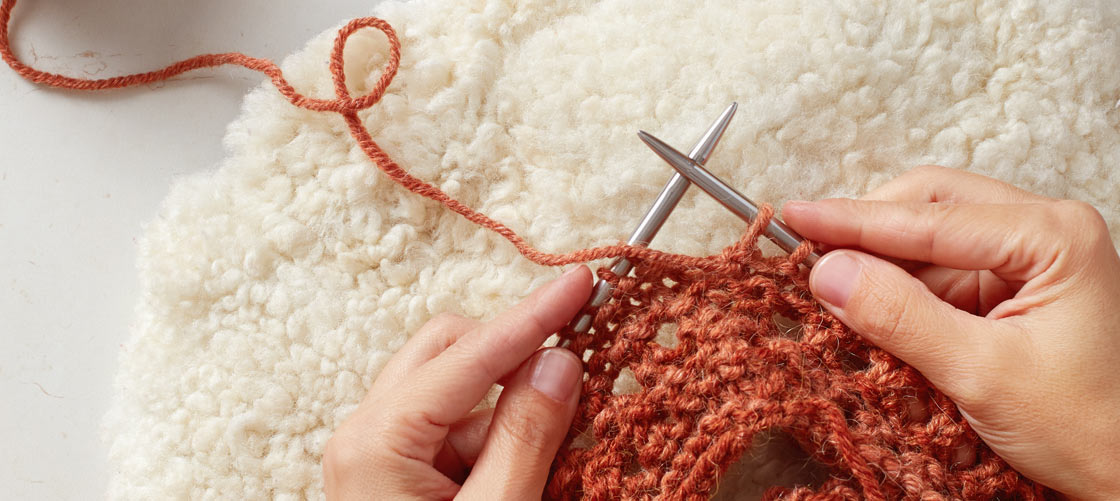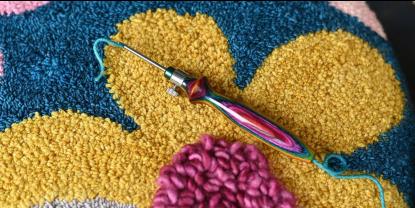There are a growing number of people using knitting as a tool to manage serious mental and physical health conditions worldwide. From increasing circulation to the fingers to giving the knitter a distraction to measurably impacting brain chemistry, knitting turns out to have a huge positive impact on the lives of knitters. Benefits fall into two basic categories: physiological and psychological.
1. Physiological Health Benefits of Knitting
Survivors of varying chronic ailments have reported the positive impact of knitting for years and science now backs their experience. Research has been published in well regarded journals of rheumatology, gerontology, neuropsychiatry, nursing, and more. Scientists at Harvard Medical School found an average reduction in blood pressure of 11 bpm in people who are knitting. On a chemical level, knitting has been found to reduce levels of a stress hormone called cortisol in the blood, as well as increasing serotonin, an important neurotransmitter for mental and physical health. Stitchlinks.com has compiled personal experience from hundreds of knitters with chronic ailments and their testimonies paint a clear picture of the impact knitting can have.
"Knitting really helps me to "switch off" and relax as well as reduces the pain and dysfunction in my hands."
"I have got a lot of benefit from knitting and cross stitch with regard to pain control, and sometimes sit up for hours knitting when the pain is too bad to sleep. I think doctors should give out needles & instructions for chronic pain sufferers!"
An estimated 20% of adults suffer from chronic pain and yet chronic pain is still not well understood and treatments are still not fully available or effective. Knitting offers a distraction from pain and requires movement of the hands and fingers which can stimulate the movement of fluid through the tissues resulting in ease of motion and reduced pain and swelling.
Knitting has even been proven to be helpful for those struggling with addiction by providing a distraction, a safe way to pass time, and stimulating release of reward chemicals in the brain.
Completing small goals frequently such as finishing stitches, rows, and projects, stimulates the brain to release feel good chemicals which has been shown to aid with addiction recovery, depression, and attention disorders. Neurological effects begin to be shown as psychological benefits when knitting is used habitually to manage health.
2. Psychological Benefits
Knitting offers numerous psychological benefits from fostering connection and community to inducing a meditative state. Engaging in a hobby where you can share with and learn from others improves the experience of people with depression, anxiety, and loneliness. People living with health concerns, especially older people, can find themselves gradually isolating from other people. Having peers with which to share patterns, techniques, and successes brings people a feeling of belonging that is fundamental to human fulfillment. Sharing with a community can also help build self-esteem for people who struggle to see their own worth.
"I find when I am sitting knitting I do not feel lazy, as I would if I just sat resting, but useful and productive. This has seriously helped me both mentally and physically. I have suffered depression over the last 3-4 years but find the boost I get from feeling "useful" really helps to lift my mood and the satisfaction of finishing a garment and the buzz of the next project really keep me going."
Knitting also has a significant impact on mood disorders. People find peace and solace in the rhythmic process of working with their hands to create. The meditative process of knitting helps people organize their thoughts, process emotion, and concentrate on something positive. In this way knitting is both process and product oriented. The end product is just as important as the process of creating it which gives the knitter constant psychological engagement with the pieces they create.
"Anytime that I go into deep depression I pick up my knitting needles, I find that to sit quietly and knit is very therapeutic and it takes away all my bad memories."
"I find knitting is calming and gives me something to concentrate on."
"I sometimes have a lot of stress in my life, and I don't always handle it very well. I am impatient and quick to anger, and though I try to manage this with other strategies (visualizing calming things, thinking calming thoughts, thinking of something funny), knitting is the only thing that calms me completely. Everything else is a temporary remedy until I can knit. I often have knitting with me, something small to work on while waiting in lines, or to take with me on my lunch hour."
Knitting gives a remarkably powerful result for its cost and availability making it a great choice for coping with life for people from all walks of life. For further reading on scientific studies of the effects of knitting check out the articles below:
- Knit for Peace. The health benefits of knitting. https://www.knitforpeace.org.uk/wp-content/uploads/2017/05/The-Health-Benefits-of-Knitting-Preview.pdf. Accessed December 5, 2018.
- Riley J, Corkhill B, Morris C. The benefits of knitting for personal and social wellbeing in adulthood: findings from an international survey. Br J Occupational Ther. 2013;76(2):50-57.
- Galvin JA, Benson H, Drecko GR, Fricchione GL, Dusek JA. The relaxation response: reducing stress and improving cognition in healthy aging adults. Compliment Ther Clin Pract.
- 2006;12(3):186-191.
- Macfarlane AC. Stress-related musculoskeletal pain. Best Pract Clin Rheumatol. 2007;21(3):549-565.
- Kelly CG, Cudney S, Weinert C. Use of creative arts as a complimentary therapy by rural women coping with chronic illness. J Holistic Nurs. 2011;30(1):48-54.
- Geda YE, Topazian HM, Roberts LA, et al. Engaging in cognitive activies, aging, and mild cognitive impairment: a population-based study. J Neuropschiatry Clin Neurosci. 2011;23(2):149-154.
- Perissinotto CM, Cenzer IS, Covinsky KE. Loneliness in older persons. Arch Intern Med. 2012;172(14):1078-1084.
- Burholt V, Schrf T. Poor health and loneliness in later life: the role of depressive symptoms, social resources, and rural environments. J Gerontol. 2013;69(2):311-324.
- Steptoe A, Shankar A, Demakakos P, Wardle J. Social isolation, loneliness, and all-cause mortality in older men and women. PNAS. 2013;110(15):5797-5801.
- Duffy K. Knitting through recovery one stitch at a time. J Groups Addiction Recovery. 2008;2(1):67-83.












